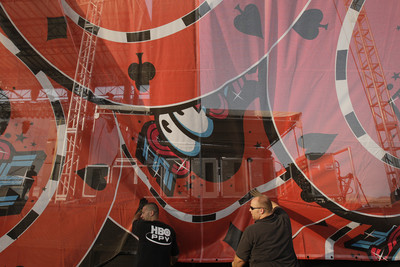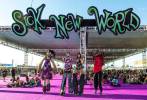Vegoose’s return in 2008 up in air
The partners behind this weekend's Vegoose music festival aren't hiding their disappointment in the nearly 58 percent drop in attendance last year, but they're not ready to say whether today marks the beginning of the Las Vegas event's swan song.
"We're back this year because we really believe in the event," said Ashley Capps, owner of Vegoose co-producer A.C. Entertainment. "We're wanting to see it grow. To be honest, I don't know whether we're doing a year four or not.
"After this year we are going to sit down, talk through everyone's perspective and determine what the future holds," Capps said.
Vegoose, which is produced by New York-based Superfly Productions and Knoxville, Tenn.-based A.C. Entertainment, the same team behind the Bonnaroo Music Festival held in Tennessee, is in the final year of a three-year agreement between the partners.
The companies were approached in 2003 by Las Vegas Events President Pat Christenson and Darren Libonati, director of Thomas & Mack Center and Sam Boyd Stadium, about customizing Bonnaroo for the Las Vegas market.
But Vegoose never showed the same kind of growth as Bonnaroo, which has emerged as one of the premier music festivals since its inception in 2002.
"We were disappointed with the turnout last year," Capps said about last year's two-day attendance of 30,625, which was down from 72,400 in 2005. "From our perspective we were very proud of what we created out there. "
Capps said he is encouraged by an increase in ticket sales leading up to this year's festival, and he expects more walk-up ticket sales throughout the festival.
"We're seeing more momentum going into the festival than we have during either of the proceeding two years," Capps said. "It will definitely be on the upswing from last year."
But whether or not there will be enough momentum to convince Vegoose's partners to return for a fourth year won't be discussed until late this year.
"It's about business economics," Libonati said. "(Superfly and A.C. Entertainment) are at a huge risk every time they attempt to put on something like this."
Libonati said the producers lost an undisclosed amount of money on last year's Vegoose.
Capps believes the rising cost of visiting Las Vegas has kept some potential Vegoose attendees away.
"Vegas is increasingly becoming a high-end destination," he said. "There is a subset of the concert-going population nationwide that can't even afford to attend the event in the first place."
The average daily room rates during last year's festival were $134.78 per night, up 28.2 percent from the previous October, according to numbers collected by the Las Vegas Convention and Visitors Authority.
And room rates will be even higher this year.
The 456-room Sunset Station, located three miles from the festival, is charging $169 per night during the festival.
The Web site for the 646-room Sam's Town, three miles north of the festival on Boulder Highway, listed rooms during the surrounding weekends at more than $100 per night.
Both properties are sold out this weekend.
Libonati said moving the festival to the middle of the week or even to another month could help bring in more attendees.
"Maybe in the future we'll look at spring opportunities versus fall opportunities," he said.
The Halloween weekend was originally chosen because of the success of a soldout show by jam band Phish in 1998 at the Thomas & Mack Center.
But Capps said the Las Vegas event always might have trouble attracting local concertgoers and media attention compared to most other areas around the country.
"This event would be a premium-profile event in most markets," Capps said. "In Las Vegas, it's just one of many things going on any given night. Getting the kind of attention this event would normally get in another market has been challenging."
Another challenge to continuing Vegoose might be just the rising cost of putting on such festivals.
Talent, touring and other related costs to bring in bands for the festival are "a far cry" from what they were when the festival started in 2005, Libonati said.
Gary Bongiovanni, editor in chief of the concert industry trade publication Pollstar, said talent fees have increased dramatically in recent years driven by two separate factors: the rising overhead costs for touring and the realization by artists that prices for concert tickets had been undervalued because of online ticket resell sites that had been driving up prices.
"That was evidenced by the fact that the secondary market exists," Bongiovanni said. "The artist might sell a ticket for $60, but the Stubhubs of the world are selling it for $300, and none of that difference between $60 and $300 is going to the artist, the promoter, the venue, anybody who's actually involved with the show."
He said many artists were initially reluctant to raise their prices because they didn't want to seem like they were profiteering, but on the other hand, they're getting taken advantage of by the current economics.
While attendance last year disappointed the organizers, the festival did provide a healthy boost to the local economy.
Nongaming revenue connected with the festival was $14.7 million in 2006 and $30.4 million in 2005.
The festival also helped boost room occupancy with 14,750 individual room nights sold in 2006 and 27,150 individual room nights sold in 2005.
Nearly 90 percent of the room nights were booked by people who came to Las Vegas just for the festival.
Features writer Jason Bracelin contributed to this report. Contact reporter Arnold M. Knightly at aknightly@reviewjournal.com or (702) 477-3893.
Schedule, News, Photos




























